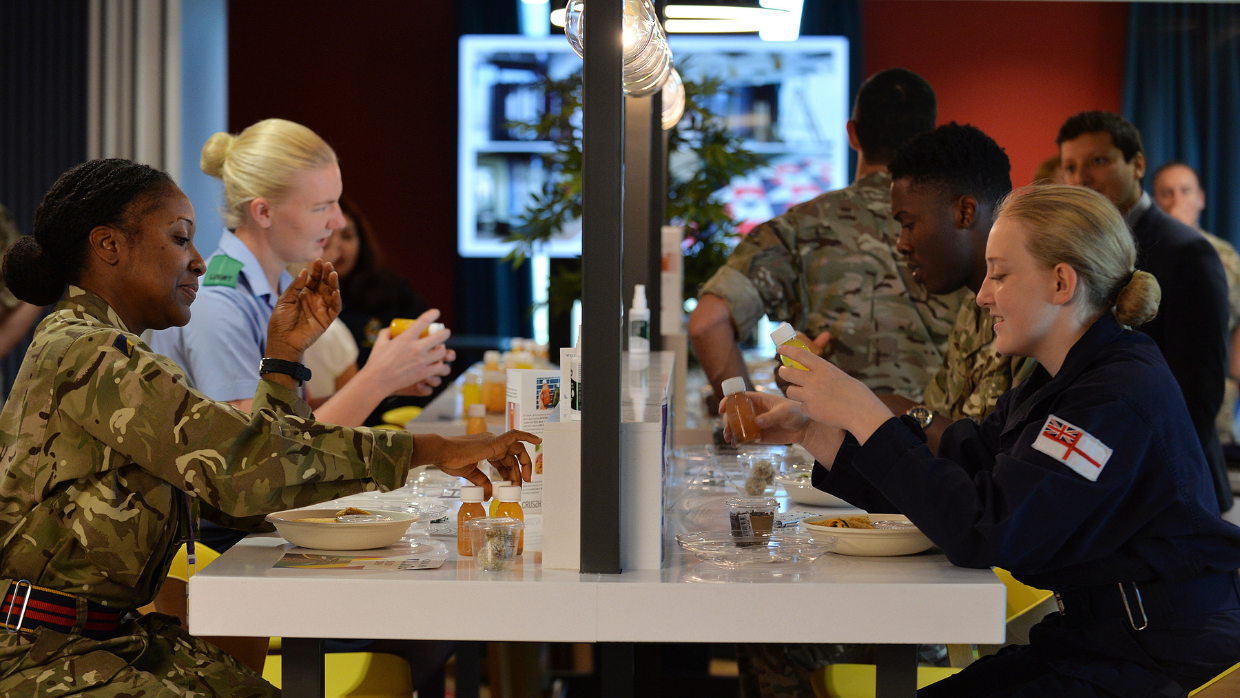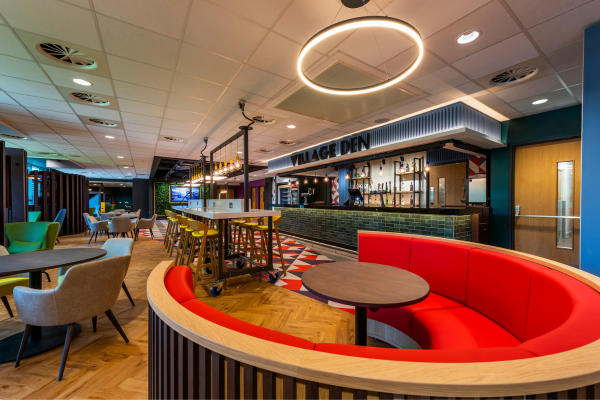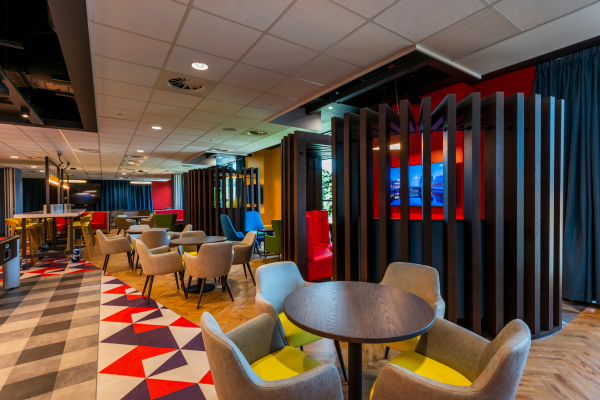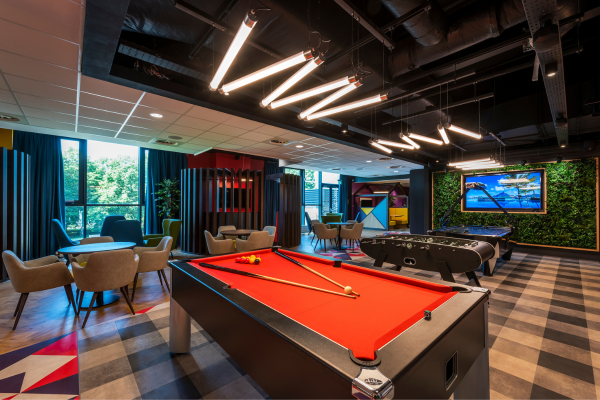
How the right physical spaces can improve the morale of military personnel
The impact of the physical environment on serving military personnel cannot be overstated. Health, wellbeing, and overall morale are significantly affected by the lived experience on base, and while maintaining these factors has posed challenges, it has also presented an opportunity to improve recruitment and retention with significant cost-saving implications. Read this case study to find out how our solution-Village- utilised these opportunities.
A multi-functional hub for the Whole Force
Discover how Sodexo and the Ministry of Defence developed a multi-functional social hub that puts the wellbeing at the heart of life on base.
Village is a stylish, future-proofed hub unlike anything else on the Ministry of Defence estate. Everything about it is tailored to the needs and priorities of each unique location and the community it serves. Download the case study to find out what made Village an award-winner at the prestigious IWFM Impact Awards 2021.
A growing body of evidence shows what many in the forces have long understood - a strong, cohesive team made up of physically and mentally-fit individuals is vital to operational capability.
Although, Armed Forces Continuous Attitudes Surveys have identified low morale and feelings of isolation, with the 2019 edition reporting that 54% of personnel were not satisfied with service life. A lack of camaraderie had a clear impact on effectiveness.
In response, Sodexo worked with the Ministry of Defence (MoD) to better understand the lived experience on base and identify new ways to improve it.
We commissioned Ipsos MORI to conduct detailed research into the challenges people were facing. It showed those feelings of isolation were worsened by a lack of community spirit, largely because there were few opportunities to socialise in welcoming environments on-base.
Insights from the AFCAS showed a low sense of community and boredom among our serving personnel, so it was really important to create an environment where they would genuinely wish to spend their time.
Designing spaces fit for the future of the forces
Detailed discussions and interactive workshops with serving members from all three services led us to believe a new kind of physical environment could reduce boredom and isolation, breathing new life into a base and impacting the lived experience of the whole force positively.
As Alex Crawford, Marketing Manager at Sodexo Government, explains, flexibility was essential. This was especially the case for junior ranks personnel, who have fewer transport options available to them, and are therefore more likely to remain on-base.
“Junior personnel are told where to go and when to go there and how long to stay for, and their daily lives are often quite mapped out for them. So, when they do have downtime, it is important that they feel comfortable.”
We worked alongside the MoD and interior and architectural design agency, Design at Source, to create a space which provides that comfort and flexibility. People told us they wanted somewhere they could relax and access quality food without the need to go off base, but also somewhere they could work and study informally.
It was important that the space accommodated not only service personnel, but their families as well. Truly future-proofing meant recognising the importance of the participation of families and the impact this could have on wellbeing. Contractors, civilians, welfare officers and others would all need to feel included and part of the team.

We spoke to the people who actually use the facilities and asked them what was important to them and why it really mattered. What we see now are these unbelievable new facilities that are the direct result of this clear insight.
The answer was Village: a one-stop, multifunctional space where people can come together, create connections, build community, and foster morale.
First introduced at Worthy Down, the concept is built around promoting physical and mental wellbeing. The space itself is bright and stylish, and the facilities compete with the high street experience enjoyed off base.
It is flexible and scalable, so it can be tailored to meet the needs of a particular location. A community manager is responsible for arranging events and activities that match the interests of the people on site to encourage people to socialise and to minimise boredom.
Design at Source are experts in the creation of leisure facilities and Director Stuart Trett explained the ability to adapt to different functions was key to driving interest.
Village encourages interaction outside of the formal training and education environments. Pods with TVs can be used for study, relaxation, or gaming competitions, while folding walls and temporary stages can be moved and reconfigured to facilitate any purpose from quiet study to a crowd watching a rugby match.
One of the issues with on-base facilities, historically, is sporadic use. If a bar is only open a limited number of evenings each week, it can lack warmth and atmosphere.
“This is not just a bar, a restaurant or even a learning space,” says Stuart. “We designed the space to be flexible. Physically, in terms of layout, but also in terms of décor and furnishings so it could function as a bar, a café, a restaurant, a theatre, a cinema, and for casual learning. It keeps it in ongoing use, serving different needs at different times.”
Award-winning physical spaces
The Village concept addresses several areas intended to improve morale. Top-class dining facilities also promote healthy eating while meeting demand for high street familiarity.
However, the real difference is felt in the physical environment, which is built around three key zones:
- A social and meeting lounge, with booths, lounge seating, large screen TVs and kitchenettes. Greenery and ‘living walls’ promote a calm and tranquil environment.
- A micro theatre, featuring a mini cinema to accommodate up to 15 people, with surround sound and the ability to stream films and TV. The space can be adapted and partitioned, with split screens for sports and gaming competitions.
- A gaming area, offering a mix of board games, pool, table tennis, console gaming and more.
Group Captain Leah Griffin, Commandant of Defence School of Logistics & Administration, says the approach has helped address many of the issues identified in the research: “Village has something on offer for everybody - each zone is designed to bring people together, to encourage collaboration and engagement, and enhance community.”
The success of the initiative was ultimately recognised at the 2021 Institute of Workplace and Facilities Management awards, where we secured the prize for Workplace Experience (non-office/corporate environment).
The military has always thrived on its social as well as professional life - team building and bonding is critical. If the team doesn’t work, then the unit doesn’t work. If the unit doesn’t work, then you lose operational capability.
The inspiration for collaborative design
Village has provided a template and an inspiration for physical spaces that positively affect morale throughout the armed forces.
It immediately proved popular with personnel, and Andrew Honnor of the Defence Infrastructure Organisation described the outcome as “breathtaking”. “There is nothing else this ‘futuristic’ on the MoD estate,” he said.
But it is just the beginning.
Mark Baker believes military sites will be built with these goals in mind in the future, rather than adapted to suit the purpose. “We’re now using real evidence to drive the future. We need to collaborate further and faster,” he says.
Truly successful design of any facility ultimately comes from a detailed understanding of military needs, fully grounded in research and engagement with the people who will use the spaces.
“If you get that right,” says Mark, “not only do you improve people’s mental health and wellbeing, but you improve recruitment, you improve retention, and you ultimately reduce your costs while improving operational effectiveness.”

